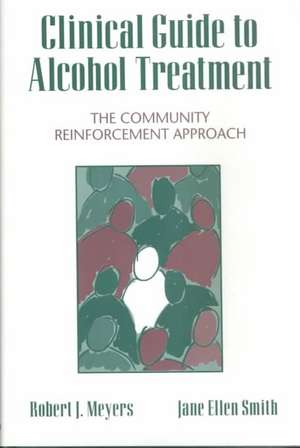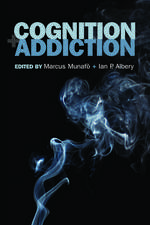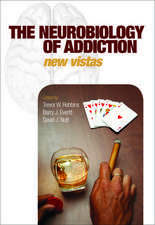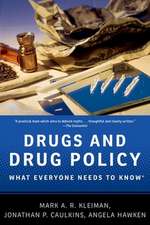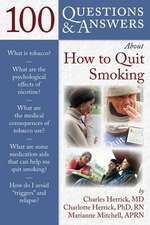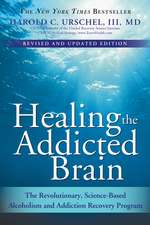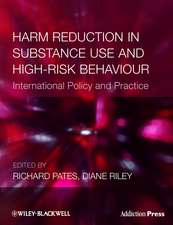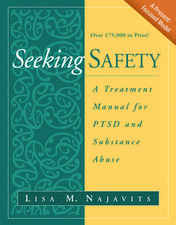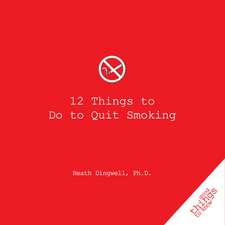Clinical Guide to Alcohol Treatment: The Community Reinforcement Approach: Guilford Substance Abuse
Autor Robert J. Meyers, Jane Ellen Smithen Limba Engleză Hardback – 2 noi 1995
This book is the first complete guide to implementing the Community Reinforcement Approach (CRA), an empirically based, highly effective cognitive-behavioral program for treating alcohol problems. An ideal program for any practitioner trying to reconcile the needs of their clients with mandates of HMOs and insurance providers, this approach has been deemed one of the most cost-effective treatments available by recent research. CRA acknowledges the powerful role of environmental contingencies in encouraging or discouraging drinking, and attempts to rearrange these contingencies so that a non-drinking lifestyle is more rewarding than a drinking one. Unique in its breadth, the approach utilizes social, recreational, familial, and vocational strategies to aid clients in the recovery process. This authoritative manual is a hands-on guide to applying these therapeutic procedures.
Opening with an account of the history of CRA and the empirical support for its efficacy, the book addresses the clinical concerns of those treating substance abusing clients. Specific instructions are provided for conducting detailed assessments of the client and interviewing concerned others. Sobriety sampling and disulfiram use within CRA are discussed in chapters of their own.
The authors then present a step-by-step guide to each component of the treatment plan, many of which have been shown to be effective forms of treatment in themselves. Topics include
* behavioral skills training
* social and recreational counseling
* marital therapy
* motivational enhancement
* job counseling
* relapse prevention
Each chapter provides detailed instructions for conducting a procedure, describes what difficulties to expect, and presents strategies for overcoming them. Sample dialogues between clients and therapists, annotated by the authors, further illuminate the treatment process. The book concludes with a chapter that both addresses the common mistakes made when implementing CRA, and emphasizes the flexibility and benefits of this total treatment plan.
An accessible and practical program, CRA can be implemented by all clinicians who treat alcohol abusing clients, regardless of orientation. Providing a cost-effective approach that is highly efficacious, Clinical Guide to Alcohol Treatment is an invaluable resource for the wide range of practitioners working in today's managed-care environment, including psychologists, psychiatrists, substance abuse counselors, and social workers.
Opening with an account of the history of CRA and the empirical support for its efficacy, the book addresses the clinical concerns of those treating substance abusing clients. Specific instructions are provided for conducting detailed assessments of the client and interviewing concerned others. Sobriety sampling and disulfiram use within CRA are discussed in chapters of their own.
The authors then present a step-by-step guide to each component of the treatment plan, many of which have been shown to be effective forms of treatment in themselves. Topics include
* behavioral skills training
* social and recreational counseling
* marital therapy
* motivational enhancement
* job counseling
* relapse prevention
Each chapter provides detailed instructions for conducting a procedure, describes what difficulties to expect, and presents strategies for overcoming them. Sample dialogues between clients and therapists, annotated by the authors, further illuminate the treatment process. The book concludes with a chapter that both addresses the common mistakes made when implementing CRA, and emphasizes the flexibility and benefits of this total treatment plan.
An accessible and practical program, CRA can be implemented by all clinicians who treat alcohol abusing clients, regardless of orientation. Providing a cost-effective approach that is highly efficacious, Clinical Guide to Alcohol Treatment is an invaluable resource for the wide range of practitioners working in today's managed-care environment, including psychologists, psychiatrists, substance abuse counselors, and social workers.
Preț: 280.69 lei
Preț vechi: 295.46 lei
-5% Nou
Puncte Express: 421
Preț estimativ în valută:
53.72€ • 55.87$ • 44.35£
53.72€ • 55.87$ • 44.35£
Carte tipărită la comandă
Livrare economică 14-28 aprilie
Preluare comenzi: 021 569.72.76
Specificații
ISBN-13: 9780898628579
ISBN-10: 0898628571
Pagini: 211
Ilustrații: illustrations
Dimensiuni: 152 x 229 x 23 mm
Greutate: 0.44 kg
Ediția:New.
Editura: Guilford Publications
Colecția Guilford Press
Seria Guilford Substance Abuse
ISBN-10: 0898628571
Pagini: 211
Ilustrații: illustrations
Dimensiuni: 152 x 229 x 23 mm
Greutate: 0.44 kg
Ediția:New.
Editura: Guilford Publications
Colecția Guilford Press
Seria Guilford Substance Abuse
Public țintă
Professional and Professional Practice & DevelopmentNotă biografică
Robert J. Meyers, PhD, is Director of Robert J. Meyers, PhD, and Associates, and is Emeritus Research Associate Professor of Psychology at the University of New Mexico, where his primary affiliation is with the Center on Alcohol, Substance use, And Addictions (CASAA). An internationally sought speaker who has delivered trainings throughout the world, Dr. Meyers is the developer of CRAFT. He is a recipient of the Dan Anderson Research Award from the Hazelden Betty Ford Foundation and the Early Career Investigator Award from the Research Society on Alcoholism. He has published nearly 100 scientific articles or chapters and 10 books, including the CRAFT self-help book Get Your Loved One Sober.
Jane Ellen Smith, PhD, is Director of Clinical Training in the Department of Psychology at the University of New Mexico.
Jane Ellen Smith, PhD, is Director of Clinical Training in the Department of Psychology at the University of New Mexico.
Recenzii
I am impressed. This volume does an excellent job of describing the Community Reinforcement Approach in an effective manner. Offering a good balance between theoretical and hands-on clinical information, the work is an outstanding practical guide to treating problem drinking using the community reinforcement approach. --Stephen T. Higgins, Ph.D. Associate Professor of Psychiatry & Psychology, University of Vermont
This volume addresses a need in the literature, and will be of great assistance in program planning and implementation. The authors have tailored the best available research and information on the community reinforcement approach into a state-of-the-art treatment program that will be invaluable to practicing clinicians and program managers who are looking for cost-effective, efficacious treatments. --David S. Timken, Ph.D.
This book is the kind of work that builds bridges, and finally allows the findings of years of careful clinical research to be applied in everyday practice. --from the foreword by William R. Miller, Ph.D.
I recommend this book to therapists and researchers who are interested in the community reinforcement approach to treating alcohol problems. In addition to detailed descriptions of a wide variety of specific treatment methods, the book provides numerous therapist-client dialogues or scripts illustrating the clinical implementation of this material. --G. Alan Marlatt, Ph.D., Director, Addictive Behaviors Research Center, University of Washington
Clinical Guide to Alcohol Treatment presents a comprehensive and compelling review of the Community Reinforcement Approach (CRA) for the treatment of substance problems, including both alcohol and cocaine abuse/dependence. From reviewing the literature on the earliest CRA trials dating back over twenty years to presenting an update on current CRA trials, this book clearly makes the case that CRA works. But the book goes far beyond a review of the literature. Its primary focus is on both assessment and how to do CRA therapy. In these respects it is very user-friendly. Not only will interested readers learn how to do CRA, they will learn how not to do CRA therapy in a useful chapter that focuses on common problems in implementing CRA. In a very real sense, this book is long overdue since CRA is perhaps one of the earliest successful applications of social learning theory. Clinical Guide to Alcohol Treatment should be useful for counselors and therapists who strive to provide the most effective treatments to their clients and for all students of social learning theory interested in effective applications. --Peter M. Monti, Ph.D., Brown University Center for Alcohol and Addiction Studies
-This volume addresses a need in the literature, and will be of great assistance in program planning and implementation. The authors have tailored the best available research and information on the community reinforcement approach into a state-of-the-art treatment program that will be invaluable to practicing clinicians and program managers who are looking for cost-effective, efficacious treatments. --David S. Timken, Ph.D.
This book is the kind of work that builds bridges, and finally allows the findings of years of careful clinical research to be applied in everyday practice. --from the foreword by William R. Miller, Ph.D.
I recommend this book to therapists and researchers who are interested in the community reinforcement approach to treating alcohol problems. In addition to detailed descriptions of a wide variety of specific treatment methods, the book provides numerous therapist-client dialogues or scripts illustrating the clinical implementation of this material. --G. Alan Marlatt, Ph.D., Director, Addictive Behaviors Research Center, University of Washington
Clinical Guide to Alcohol Treatment presents a comprehensive and compelling review of the Community Reinforcement Approach (CRA) for the treatment of substance problems, including both alcohol and cocaine abuse/dependence. From reviewing the literature on the earliest CRA trials dating back over twenty years to presenting an update on current CRA trials, this book clearly makes the case that CRA works. But the book goes far beyond a review of the literature. Its primary focus is on both assessment and how to do CRA therapy. In these respects it is very user-friendly. Not only will interested readers learn how to do CRA, they will learn how not to do CRA therapy in a useful chapter that focuses on common problems in implementing CRA. In a very real sense, this book is long overdue since CRA is perhaps one of the earliest successful applications of social learning theory. Clinical Guide to Alcohol Treatment should be useful for counselors and therapists who strive to provide the most effective treatments to their clients and for all students of social learning theory interested in effective applications. --Peter M. Monti, Ph.D., Brown University Center for Alcohol and Addiction Studies
The 'Community Reinforcement Approach' (CRA)...is an idea whose time has clearly come....CRA operates from a disarmingly straight forward approach, which is probably more immediately accessible to clients than many forms of psychotherapy....The dialogues are pithy, illustrative, and pleasantly pointed....As I was reading, I could immediately think of a number of ideas that I could incorporate into everyday practice, whether or not I should ever adopt CRA....Its extensive appendices are lucid and cogent documentation of the instruments CRA employs. Even the price is right for the quality of the work. Run right out and buy it. You will be up tonight reading through it.
--Journal of Substance Abuse Treatment, 8/6/1995Cuprins
History of the Community Reinforcement Approach. CRA Assessment. Sobriety Sampling. Disulfiram Use Within CRA. CRA Treatment Plan. Behavioral Skills Training. Additional CRA Techniques. Social and Recreational Counselling. CRA Marital Therapy. CRA Relapse Prevention. The Big Picture.
Descriere
This book is the first complete guide to implementing the Community Reinforcement Approach (CRA), an empirically based, highly effective cognitive-behavioral program for treating alcohol problems. An ideal program for any practitioner trying to reconcile the needs of their clients with mandates of HMOs and insurance providers, this approach has been deemed one of the most cost-effective treatments available by recent research. CRA acknowledges the powerful role of environmental contingencies in encouraging or discouraging drinking, and attempts to rearrange these contingencies so that a non-drinking lifestyle is more rewarding than a drinking one. Unique in its breadth, the approach utilizes social, recreational, familial, and vocational strategies to aid clients in the recovery process. This authoritative manual is a hands-on guide to applying these therapeutic procedures.
Opening with an account of the history of CRA and the empirical support for its efficacy, the book addresses the clinical concerns of those treating substance abusing clients. Specific instructions are provided for conducting detailed assessments of the client and interviewing concerned others. Sobriety sampling and disulfiram use within CRA are discussed in chapters of their own.
The authors then present a step-by-step guide to each component of the treatment plan, many of which have been shown to be effective forms of treatment in themselves. Topics include
* behavioral skills training
* social and recreational counseling
* marital therapy
* motivational enhancement
* job counseling
* relapse prevention
Each chapter provides detailed instructions for conducting a procedure, describes what difficulties to expect, and presents strategies for overcoming them. Sample dialogues between clients and therapists, annotated by the authors, further illuminate the treatment process. The book concludes with a chapter that both addresses the common mistakes made when implementing CRA, and emphasizes the flexibility and benefits of this total treatment plan.
An accessible and practical program, CRA can be implemented by all clinicians who treat alcohol abusing clients, regardless of orientation. Providing a cost-effective approach that is highly efficacious, Clinical Guide to Alcohol Treatment is an invaluable resource for the wide range of practitioners working in today's managed-care environment, including psychologists, psychiatrists, substance abuse counselors, and social workers.
Opening with an account of the history of CRA and the empirical support for its efficacy, the book addresses the clinical concerns of those treating substance abusing clients. Specific instructions are provided for conducting detailed assessments of the client and interviewing concerned others. Sobriety sampling and disulfiram use within CRA are discussed in chapters of their own.
The authors then present a step-by-step guide to each component of the treatment plan, many of which have been shown to be effective forms of treatment in themselves. Topics include
* behavioral skills training
* social and recreational counseling
* marital therapy
* motivational enhancement
* job counseling
* relapse prevention
Each chapter provides detailed instructions for conducting a procedure, describes what difficulties to expect, and presents strategies for overcoming them. Sample dialogues between clients and therapists, annotated by the authors, further illuminate the treatment process. The book concludes with a chapter that both addresses the common mistakes made when implementing CRA, and emphasizes the flexibility and benefits of this total treatment plan.
An accessible and practical program, CRA can be implemented by all clinicians who treat alcohol abusing clients, regardless of orientation. Providing a cost-effective approach that is highly efficacious, Clinical Guide to Alcohol Treatment is an invaluable resource for the wide range of practitioners working in today's managed-care environment, including psychologists, psychiatrists, substance abuse counselors, and social workers.
